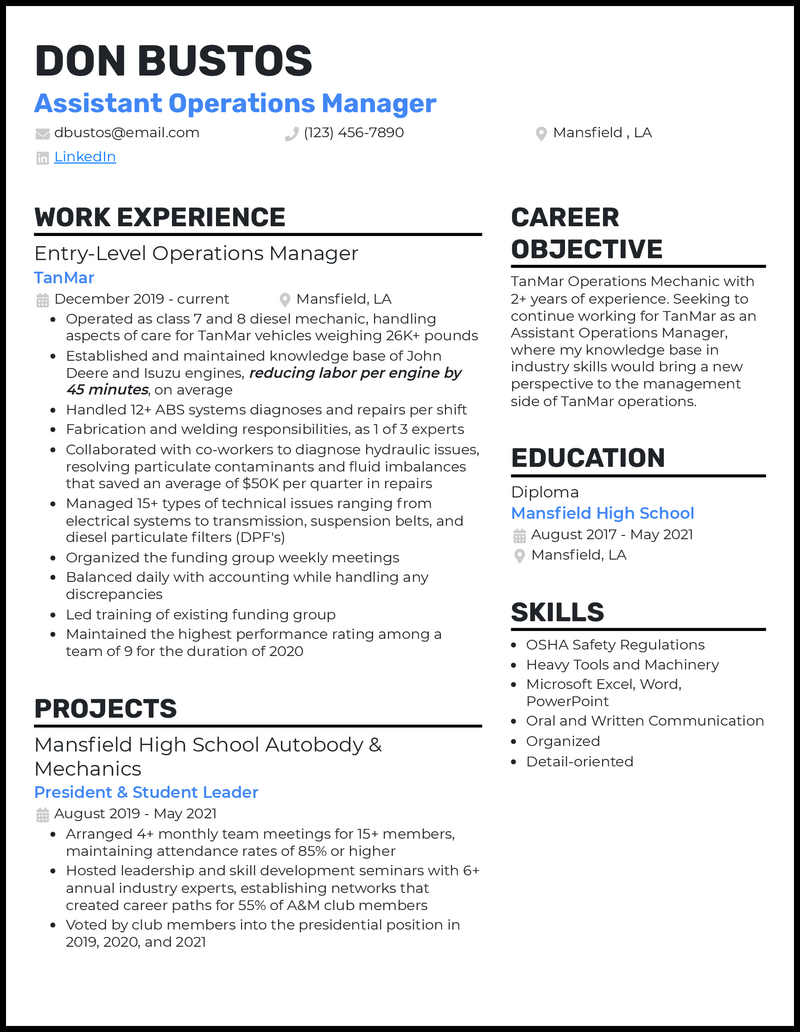You help the operations manager with daily tasks such as customer relations, staffing and scheduling, and task delegation. You might also assist with assigning duties directly, maintaining policy compliance, and answering employees’ questions.
But you still may have some questions of your own about your resume and creating a cover letter. How long should it be? What should go on it?
Don’t worry about it, we’ve got this covered! Take some inspiration from our sample resumes and five resume templates that have helped assistant operations managers like you before.
What Matters Most: Your Skills & Experience Sections

It’s time to use your skills section as an opportunity to give recruiters a snapshot of your very well-rounded abilities presented in an analytical way.
That means it’s time to get technical—even your soft skills. Anything you include in this section should be directly relevant to the job, and it should be as technical and non-debatable as possible.
Instead of saying that you’re “hard-working” or something else that’s subjective and could apply to any field, stick with abilities that are truly specific to your role. Include skills that show which field you specialize in:
9 top assistant operations manager skills
- OSHA Regulations
- Heavy Machinery
- MS Excel
- MS Word
- Employee Training
- Safety Workshops
- Google Analytics
- Vendor Negotiations
- Budget Analysis
Sample assistant operations manager work experience bullet points
Nice set of skills! Being specific and honing a theme centered around your personal niche can go a long way. And the same principle applies to your experience points!
Recruiters want to see that you can leverage your skills toward specific goals in your field, such as improving relationships and delivery services with suppliers or collaborating with IT to optimize data management. Bring in examples that are highly relevant to your unique job role.
And always measure the impact you’ve had as an assistant operations manager! You may not be in a senior role, but you’ve undoubtedly helped create or implement strategies to improve workflow—so provide quantifiable data to reinforce each achievement.
Here are some samples:
- Co-hosted leadership and skill development seminars with over six industry experts, establishing networks that created career paths for 56% of all student attendees
- Collaborated with co-workers to diagnose hydraulic issues, resolving particulate contaminants and fluid imbalances to save an average of $51K per quarter in repairs
- Handled 12+ ABS systems diagnoses and repairs per shift, surpassing goals by 12%
- Arranged monthly team meetings to refresh group strategies and boost efficiency, maintaining attendance rates of 86% or higher and boosting productivity by 19%
Top 5 Tips for Your Assistant Operations Manager Resume
- Show your specialty!
- It’s worth repeating: An assistant operations manager can find their home within almost any field, so make it clear where yours is. Do you improve strategies for warehouse safety and delivery times? Do you help develop new HR policies and office initiatives? Make sure recruiters don’t have to ask!
- Use a no-nonsense template
- You might feel tempted to make things look more fun by pulling in some unusual colors or fonts, but as an assistant operations manager, you already know that efficiency is key. Recruiters spend seconds skimming your job app, so choose a professional resume template.
- Demonstrate leadership
- Anyone in a role like yours should demonstrate leadership, project ownership, and personal initiative. Recruiters want to see which projects you’ve led, which strategies you’ve helped develop, and which daily employee success factors you’ve maintained. Show where you’ve taken charge of success!
- Slim down your bullet points
- It can be tough to pack all your most valuable information into a simple bullet point! Just remember: Recruiters want to see what you did, why you did it, and what quantifiably successful results it created. For example, maybe you helped create a new employee schedule to fill gaps and measurably increased productivity.
- Gotta love that cover letter!
- The cover letter is the perfect landing pad for any achievements you couldn’t quite fit on your resume. Maybe you only briefly touched on improving inventory levels in your resume; now could be the time to expound on how you met that challenge and came out on top.
Your skills and experience section. Let your Lean Six Sigma methodology or financial analytics skills (or whatever your superpowers are) take the spotlight at the top of your skills list and and demonstrate those skills in action in your work experience.
Even if you worked in previous roles that don’t relate directly to operations management, remember there’s bound to be some overlap. Look for experiences and achievements that align with your current role, like retention rates or efficiency improvement percentages.
Just one page! Don’t go over because two-page resumes are more likely to be pushed aside in favor of more efficient ones. Remember, your whole job rests on an efficient and effective foundation. Your resume should do the same.










